Why NetSuite Salesforce Automation is Critical for Modern Sales Teams
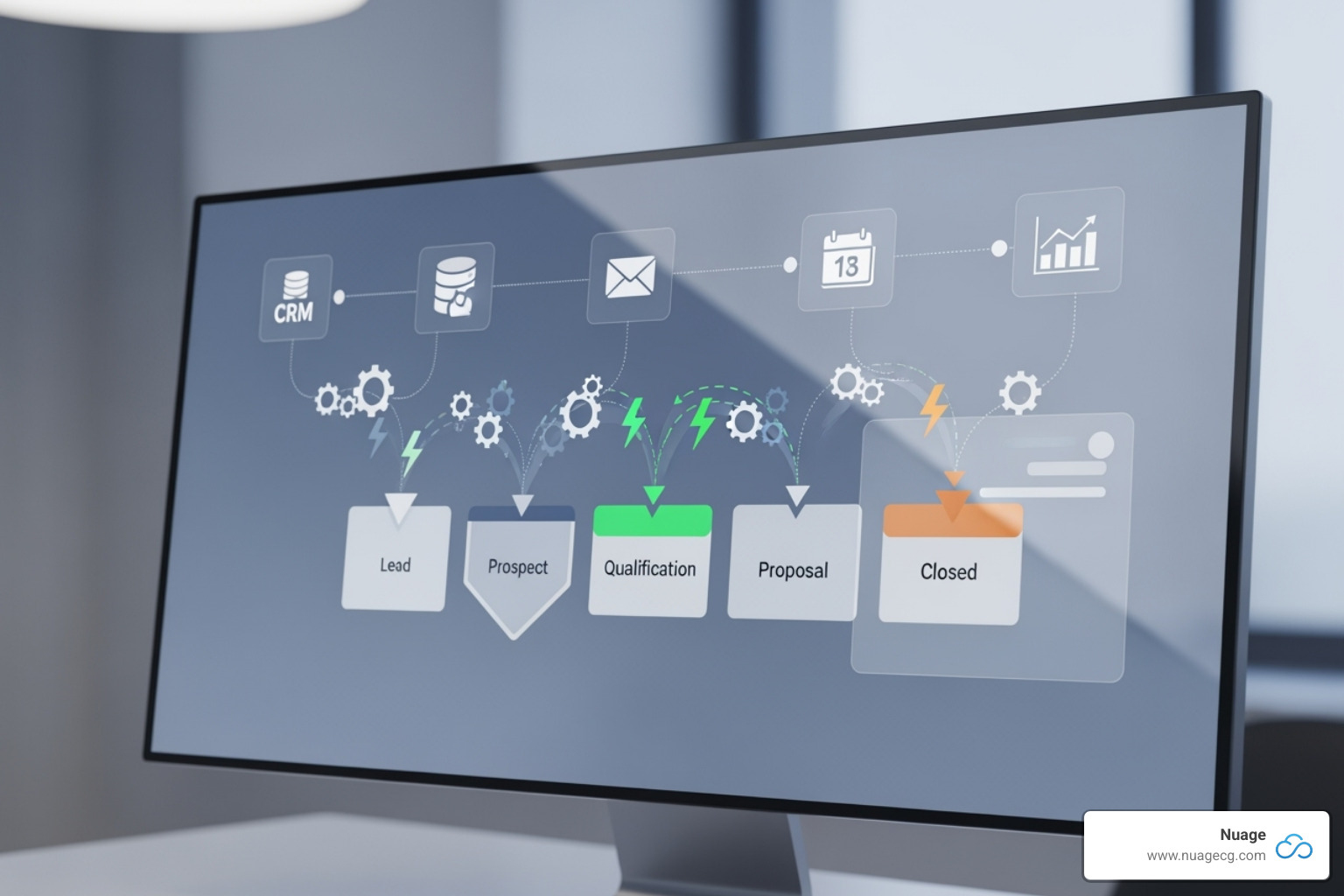
NetSuite salesforce automation uses NetSuite’s Sales Force Automation (SFA) tools—either standalone or integrated with Salesforce CRM—to streamline sales, eliminate manual tasks, and drive revenue through intelligent workflows.
Quick Answer for NetSuite Salesforce Automation:
- NetSuite SFA Features: Manage opportunities, quotes, forecasts, commissions, and team performance.
- Salesforce Integration Benefits: Combines NetSuite’s ERP power with Salesforce’s CRM expertise for complete lead-to-ledger automation.
- Key Automation Areas: Lead scoring, email follow-ups, quote generation, order processing, and sales reporting.
- Expected Results: Achieve a 10-15% operational efficiency boost and reduce management time from 75 to 11 hours monthly.
Most businesses waste countless hours on repetitive sales tasks that don’t generate revenue. This operational friction costs real money and competitive advantage. With the global sales force automation market projected to reach $21 billion by 2032, automation is no longer optional—it’s the key to success.
With over 15 years of experience helping businesses open up NetSuite‘s potential, I’ve seen that most companies only scratch the surface of NetSuite salesforce automation capabilities. That’s where the biggest opportunities for growth lie.
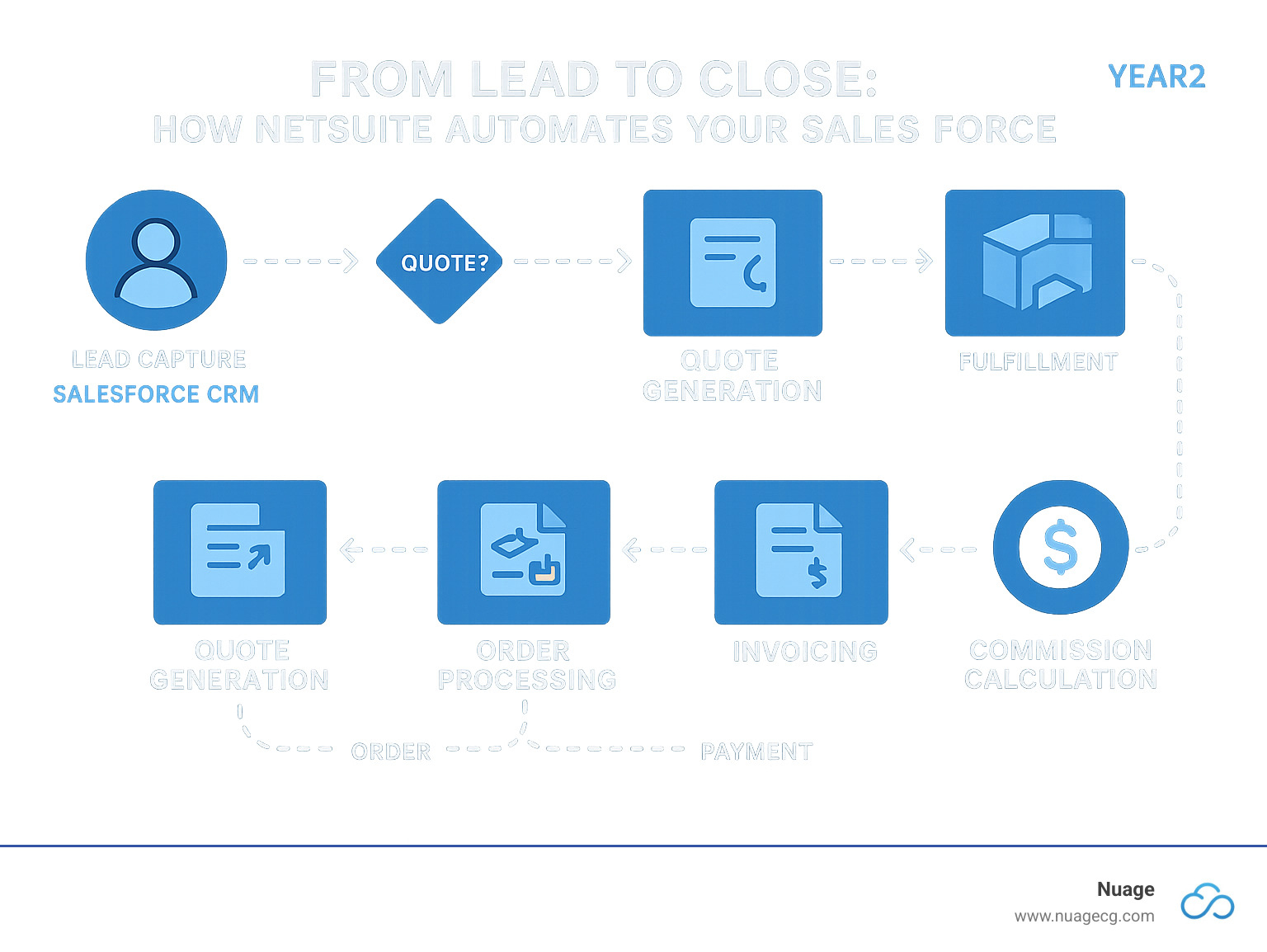
Key terms for netsuite salesforce automation:
What is Sales Automation and Why Does It Matter?
Sales automation uses technology, including AI, to handle the repetitive administrative tasks that consume your team’s valuable time. It allows your sales reps to focus on what they do best: building relationships and closing deals.
How does this differ from marketing automation? Marketing automation gets people interested, while sales automation turns that interest into revenue. Marketing automation nurtures leads at the top of the funnel. Once a lead is qualified, sales automation takes over to manage the deal.
NetSuite salesforce automation combines powerful workflow automation with real-time data insights. When sales and financial systems work together, manual errors disappear, data accuracy improves, and your team can trust the numbers. Companies using sales automation typically see 10-15% efficiency improvements. With over 40% of sales professionals already using AI, this technology is no longer a future concept—it’s a present-day necessity for staying competitive. To learn more about how a modern CRM can accelerate your sales cycle, Sell Faster and Smarter with a CRM Solution offers valuable insights.
Key Benefits of Automating Your Sales Process
Automating your sales process delivers benefits across your entire business.
- Increased Productivity: Reps spend less time on administrative work and more time on revenue-generating activities.
- Higher Sales Success Rates: Automation helps prioritize the hottest leads and ensures consistent, timely follow-ups so no opportunity is missed.
- Improved Forecasting Accuracy: Real-time data from automated systems provides reliable insights for better resource allocation and growth planning.
- Improved Customer Experience: Automated, professional communication and quick quote generation make buyers feel valued.
- Reduced Operational Costs: Less manual effort means you can accomplish more with your current team and redirect resources to strategic growth.
Common Sales Tasks to Automate
Modern sales automation can streamline nearly any manual task your team handles.
- Lead Scoring and Prioritization: Automatically rank leads based on engagement and demographics so reps know who to contact first.
- Email Templating and Follow-ups: Ensure consistent communication and timely follow-ups without manual effort.
- Meeting Scheduling: Eliminate back-and-forth emails by allowing prospects to book meetings directly on your team’s calendar.
- Quote Generation and Order Processing: Instantly create professional proposals and seamlessly convert closed deals into sales orders.
- Commission Calculations: Automate commission tracking for accurate, timely payments that keep your team motivated.
- Pipeline Management: Gain a clear view of every deal with automated reminders and smooth stage progressions.
- Reporting and Analytics: Generate instant reports on performance, allowing managers to focus on coaching and strategy instead of compiling data.
The Consequences of Not Automating
Sticking with manual processes in today’s market is a significant risk.
- Wasted Time and Resources: Your team spends valuable hours on data entry instead of selling, which is inefficient and demoralizing.
- Data Accuracy Problems: Manual entry leads to errors, duplicate records, and inconsistent information, resulting in poor decision-making.
- Poor Customer Relationships: Slow follow-ups and inconsistent communication make prospects feel undervalued and can kill deals.
- Missed Opportunities: Without automated tracking, high-potential leads can be neglected and slip away to more responsive competitors.
- Inability to Scale: Manual processes create bottlenecks as your business grows, forcing you to hire for administrative tasks rather than revenue-generating roles.
- Competitive Disadvantage: While you’re stuck with outdated processes, competitors using netsuite salesforce automation are closing deals faster and delivering a better customer experience.
A Deep Dive into NetSuite’s Sales Force Automation (SFA) Capabilities
While known for its powerful ERP, NetSuite also offers robust sales automation features. This integrated approach is what makes NetSuite salesforce automation so compelling. Your sales team can manage opportunities and generate quotes while accessing real-time inventory levels, customer payment history, and order status—all within one system.
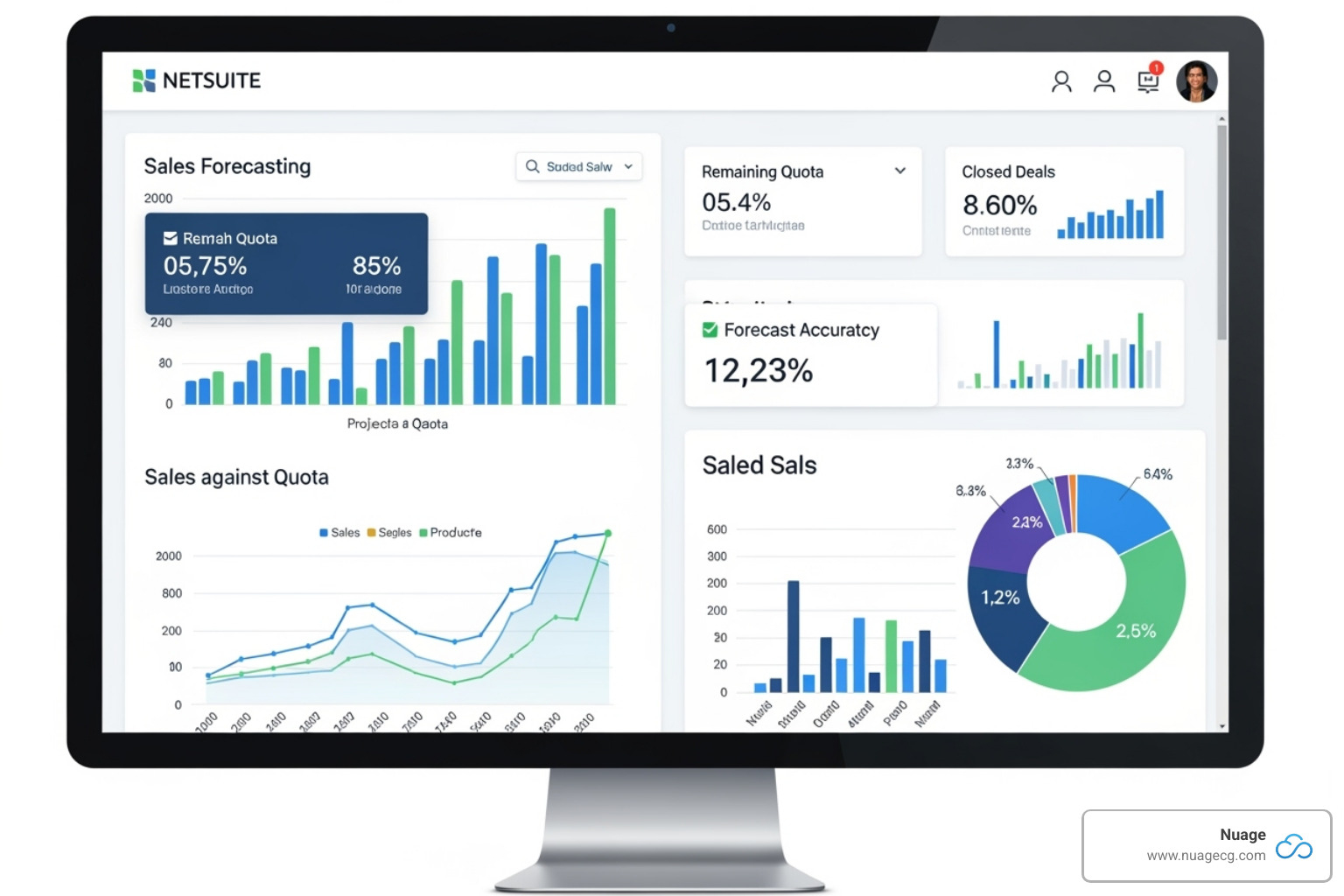
NetSuite’s Sales Force Automation covers the entire sales journey, from opportunity management and quote-to-order processing to sales forecasting and commission management. The key is how these pieces work together. When a quote becomes an order, fulfillment is notified instantly. When it ships, the customer is updated automatically. This unified view, providing insight into everything from contact info to payment history and support tickets, transforms how sales teams operate. At Nuage, we’ve seen this complete picture drive significant improvements.
Managing Your Sales Team and Performance
NetSuite’s SFA gives managers the real-time insights needed to lead effectively.
- Team Selling: Create sales teams with defined roles and contribution percentages to track complex deals and credit team members appropriately.
- Quota Management: Set and track quotas for individuals or teams. The system automatically records progress against closed sales for a clear view of performance.
- Real-Time Dashboards: Monitor pipeline changes, conversion rates, and sales velocity as they happen. This allows managers to spot problems early and celebrate wins instantly.
- Upsell and Cross-Sell Recommendations: The system analyzes customer purchase history to suggest logical next purchases, taking the guesswork out of account growth.
To see these features in action, watch this NetSuite CRM for Sales video.
From Prospect to Customer: Streamlining the Entire Sales Cycle
NetSuite salesforce automation connects the entire customer journey seamlessly.
- Lead and Contact Management: Automatically route new leads to the right reps. When a rep accesses a contact, they see the complete relationship history—past orders, support interactions, and payment patterns.
- Opportunity Management: Track every interaction associated with a deal, including emails, meetings, and calls, keeping the pipeline organized and accurate.
- Quote-to-Order Process: Sales generates a quote with current pricing and inventory. Customer approval instantly converts it into a sales order, alerting fulfillment and accounting.
- Order Management and Fulfillment: Once an order is created, inventory is allocated, pick lists are generated, and shipping notifications are sent automatically.
- Invoicing and Contract Renewals: Invoicing follows seamlessly with all correct details. The system also tracks renewable assets and sends automated reminders to secure recurring revenue.
For a detailed look at maximizing your sales process, see the Sales Force Automation: Growing Relationships and Closing Deals Guide
The Power Couple: Why Integrating NetSuite and Salesforce is a Game-Changer
Sometimes the best solution isn’t choosing between two great systems—it’s bringing them together. While NetSuite has solid CRM capabilities, many businesses combine Salesforce’s specialized CRM with NetSuite’s comprehensive ERP for a truly powerful solution.
Think of it this way: Salesforce excels at everything customer-facing, like lead management and pipeline automation. NetSuite is your operational backbone, handling financials, inventory, and supply chain.
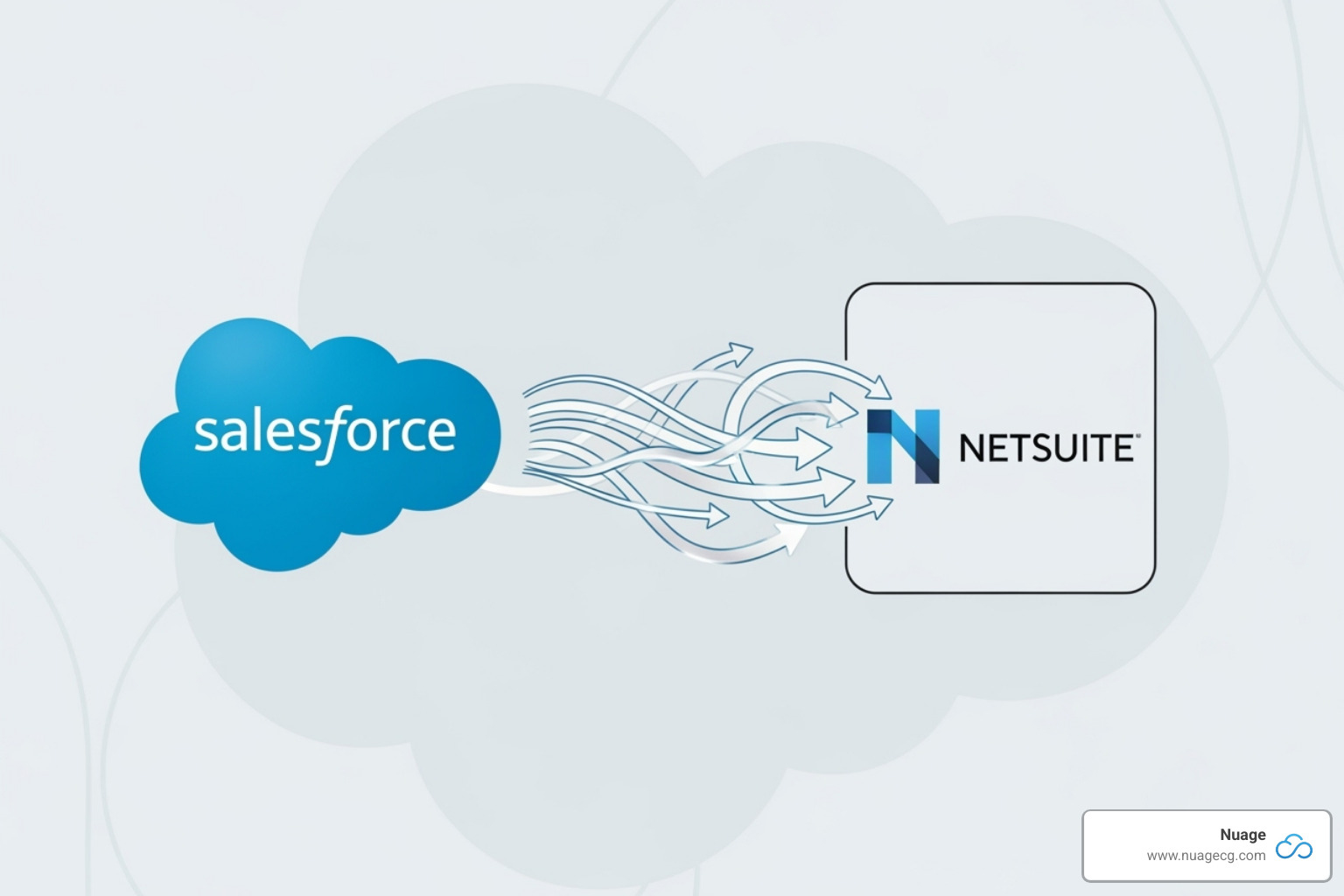
Integrating these two powerhouses creates a seamless NetSuite salesforce automation bridge between your front and back offices. Data silos disappear. Your sales team gets real-time visibility into order status, product availability, and customer payment history right within their Salesforce interface. Meanwhile, your finance team automatically receives sales orders for processing in NetSuite. The result is a true 360-degree customer view. For more on this, see our guide on Salesforce Integration with NetSuite.
The Case for a Best-of-Breed Approach
The “best-of-breed” strategy means using each system for what it does best.
- Salesforce for CRM Expertise: Its Sales, Marketing, and Service Clouds offer best depth in customer engagement. The AppExchange provides thousands of specialized apps to customize your sales process.
- NetSuite for ERP Strength: As your operational core, NetSuite ERP unifies financial management, accounting, and inventory control into a single platform, ensuring accurate reporting and operational efficiency.
This integration eliminates duplicate data entry, one of the biggest productivity killers. We’ve seen companies reduce administrative overhead from 75 hours per month to just 11, freeing up teams for strategic work.
Common Challenges in NetSuite Salesforce Automation and How to Overcome Them
Integrating two sophisticated systems has its challenges, but they are solvable.
- Data Mapping: Aligning different data structures for customers, products, and transactions requires careful planning.
- Custom Objects and Workflows: Your unique customizations in both platforms need special attention to sync correctly.
- API Limits: High-volume data synchronization can hit API call limits on NetSuite and Salesforce, causing delays.
- Error Handling: You need a robust process to catch and resolve sync failures without losing critical business data.
- System Updates: Regular platform updates can impact integrations, requiring ongoing maintenance.
Solutions include using iPaaS platforms (Integration Platform as a Service) with pre-built connectors and robust error handling, or partnering with expert implementation partners. With two decades of experience, we design scalable and secure integration solutions custom to your business needs, ensuring your integration works reliably over the long term.
Achieving Seamless NetSuite Salesforce Automation
True NetSuite salesforce automation ensures a continuous flow of information between your sales and operational systems. It’s about orchestrating business processes so that an action in one system triggers a relevant update in the other.
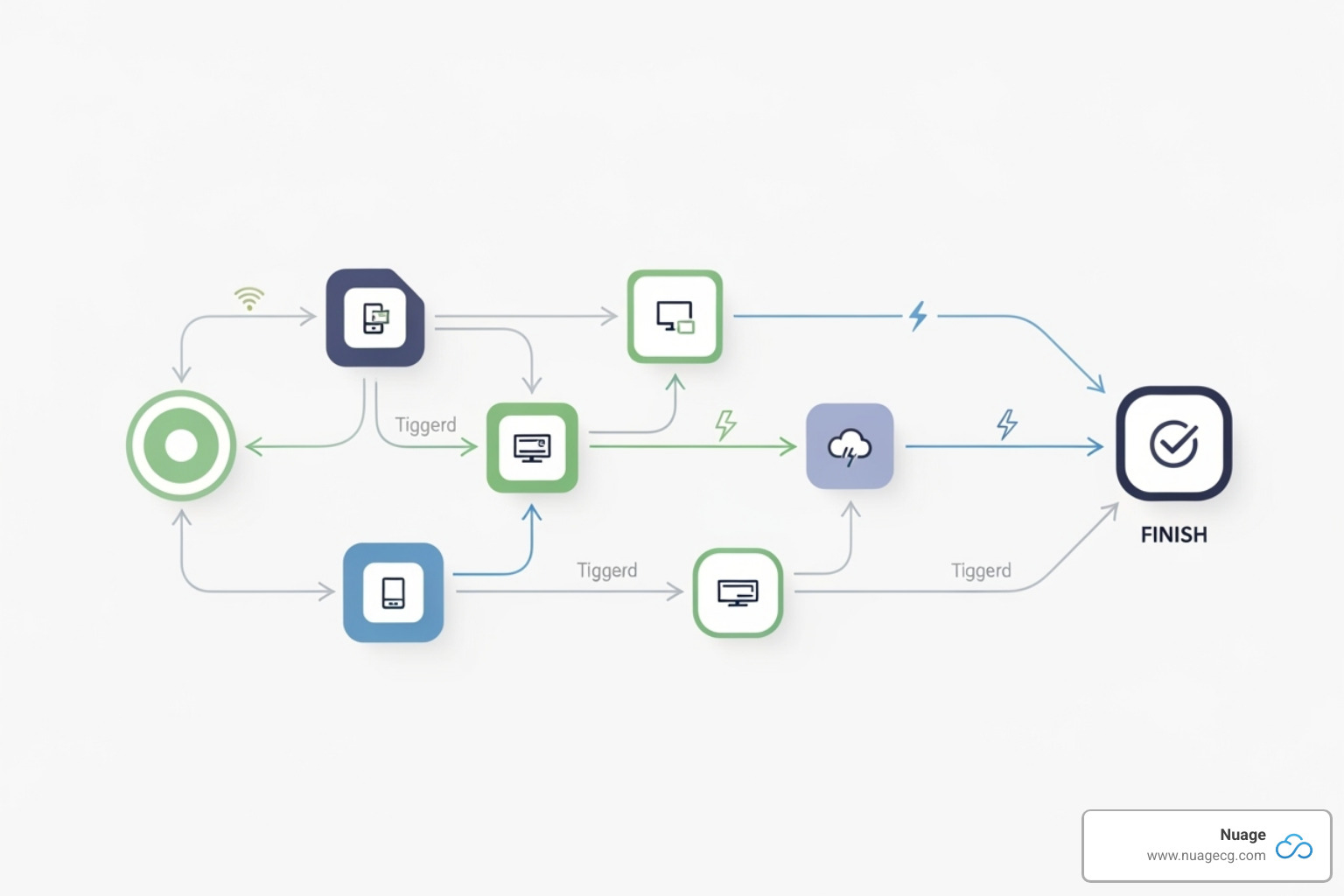
The most efficient and scalable solution for most businesses is an Integration Platform as a Service (iPaaS). These platforms provide the tools and connectors to build, deploy, and manage integrations without extensive coding, leading to faster implementation and easier management. For an overview of how we can help, visit our NetSuite Integration Services page.
Choosing the Right Integration Platform
Selecting the right platform is critical for success. Key factors to consider include:
- Pre-built Connectors vs. Custom Solutions: Pre-built connectors from established iPaaS vendors accelerate deployment for standard use cases. Custom API development offers maximum flexibility for unique processes but requires more technical resources. Learn more about How to Do NetSuite and Salesforce Integration Using Salesforce API.
- Scalability: The platform must handle growing data volumes and support both batch and real-time synchronization.
- Security: Ensure the platform adheres to industry standards like encryption and secure authentication (OAuth 2.0, Token-Based Authentication) and offers audit trails.
- Ease of Use: Low-code/no-code interfaces empower your internal teams to manage integrations, reducing reliance on developers.
- Total Cost of Ownership (TCO): Consider ongoing maintenance, support, and customization costs beyond the initial setup.
- Error Handling and Monitoring: The platform should provide clear dashboards, alerts, and logs to monitor integration health and resolve errors quickly.
Best Practices for a Successful NetSuite Salesforce Automation Project
Our experience has highlighted several crucial best practices for any integration project:
- Define Clear Objectives: Articulate what you want to achieve (e.g., streamline order-to-cash, improve forecasting) to guide decisions and measure success.
- Involve Key Stakeholders: Include a cross-functional team (sales, finance, IT) from the start to ensure buy-in and smooth adoption.
- Ensure Data Governance: Cleanse data before migration and establish clear mapping and standardization rules to maintain data quality.
- Plan for Scalability: Design a modular architecture that can easily accommodate future growth and new processes.
- Test Thoroughly: Conduct rigorous unit, integration, and user acceptance testing (UAT) to ensure everything functions as expected.
- Provide User Training: Train all affected teams on the new integrated systems and workflows to ensure the technology is used effectively.
- Document Diligently: Keep detailed documentation of data mappings, workflows, and procedures for troubleshooting and future improvements.
Frequently Asked Questions about NetSuite and Sales Automation
Over two decades in digital change, we’ve seen the same questions arise as businesses explore NetSuite salesforce automation. Here are the answers that matter.
Why integrate NetSuite with Salesforce if NetSuite already has a CRM?
While NetSuite offers a solid, integrated CRM, many sales teams thrive on the specialized, advanced features of Salesforce. Salesforce lives and breathes sales and marketing, offering sophisticated pipeline management and a vast ecosystem of sales-focused apps.
Integrating the two creates a best-of-breed approach. Your sales team gets the cutting-edge tools they love in Salesforce, while critical customer and order data flows seamlessly into NetSuite for accurate financial reporting and operational management. It provides a single source of truth, combining specialized excellence with unified data.
What kind of data is typically synced between NetSuite and Salesforce?
A successful NetSuite salesforce automation integration ensures information flows smoothly between front-office sales and back-office operations. The most valuable synced data includes:
- Customer and Contact Information: A single, accurate customer record for all teams.
- Sales Orders and Quotes: Automatic transfer from Salesforce to NetSuite upon closing, eliminating manual entry.
- Products and Pricing: Synchronized catalogs so sales always quotes current, available products.
- Inventory Levels: Real-time data from NetSuite gives sales visibility into what’s in stock.
- Invoices and Payment Status: Financial data flows back to Salesforce, giving sales and service teams a complete customer view.
This exchange eliminates the frustrating “let me check another system” delays that slow down deals.
Can sales automation replace my sales team?
Absolutely not. Sales automation is a superpower for your team, not a replacement. It handles the tedious, administrative tasks that prevent your best salespeople from focusing on what they do best: building relationships, solving complex problems, and negotiating deals.
No software can replicate the trust and rapport of a genuine human connection. Automation handles tasks like data entry, scheduling follow-ups, and generating reports. When we implement NetSuite salesforce automation, we see sales reps get significant time back for strategic selling. They become more effective, more strategic, and happier focusing on work that drives revenue. Automation amplifies your team’s talent, ensuring they can use their skills where they count most.
Conclusion: Unify Your Business from Lead to Ledger
Adopting NetSuite salesforce automation—whether through NetSuite’s native SFA or a Salesforce integration—is about fundamentally changing how your business operates. You are investing in a unified vision where every customer interaction, sale, and financial transaction flows seamlessly together.
When a sales team closes a deal, the information instantly flows into NetSuite, triggering inventory checks, generating invoices, and updating financial forecasts. This is what true unified business processes look like. The benefits are tangible: 10-15% efficiency improvements, drastically reduced administrative time, and improved data accuracy. These aren’t just statistics; they represent real time your team gets back to focus on growth.
Data-driven decisions become the norm. Your forecasts become more reliable, customer service improves, and your competitive edge sharpens. While challenges like data mapping and API limits are real, they are solvable with the right expertise. Our 20+ years of digital change experience is invaluable here.
As your NetSuite optimization engine and a certified NetSuite ERP Implementation Partner, we help you build a powerful, automated ecosystem custom to your needs. We don’t just implement technology; we help you reimagine your entire sales-to-fulfillment process.
The future belongs to businesses that are agile, data-driven, and customer-focused. Don’t let disconnected systems hold you back.
Ready to transform your business from lead to ledger? Transform your sales process with our Salesforce Stratus integration services and find what unified, automated operations can do for your bottom line.